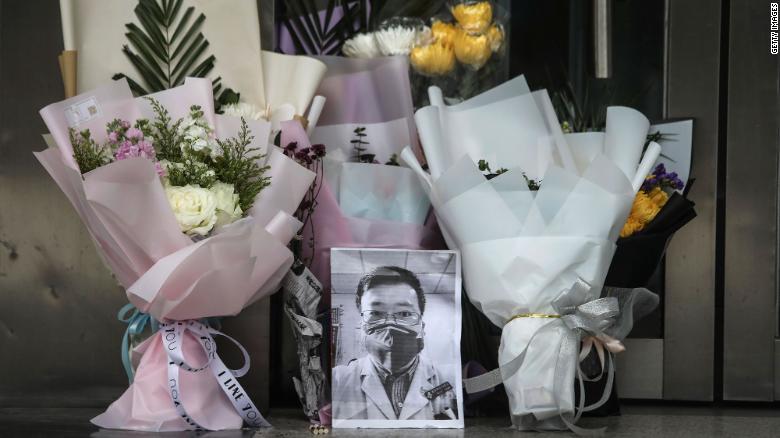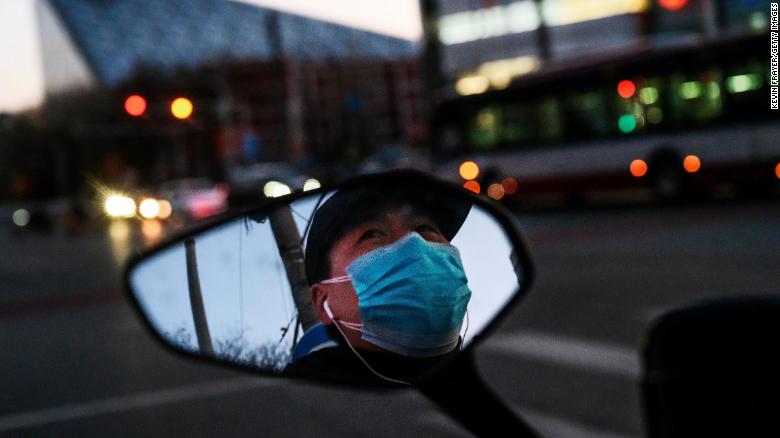China is struggling with coronavirus disinformation after writing off inconvenient truths as fake news
The word "rumor" has taken on a different meaning in China since the death of Li Wenliang, the doctor who was punished for trying to warn others about the spread of coronavirus.
Instead of doubtful hearsay, the word has come to connote the inconvenient truths that authorities are trying to hide -- just like Li's attempt to expose a dangerous outbreak that has to date claimed more than 2,900 lives, including his own.
"Rumor is just a prophecy far ahead of our times," says a quote widely shared online in China in recent weeks.
The idea speaks to the mounting anger among many Chinese people over the government's censorship, with unpleasant truths written off as "rumors" and truth tellers threatened or faced with punishment.
China has paid a price for silencing the truth. If the warnings of Li and other medical workers had not been muzzled, they could have raised more awareness among the public and better prepared them for the deadly outbreak, which has now sickened over 84,000 people and placed hundreds of millions under varying forms of lockdown.
But concealing the truth has caused another problem. Amid dwindling public trust, authorities are finding it increasingly difficult to combat potentially harmful disinformation.

Doctor Li Wenliang, who was punished by police for "rumor-mongering," was hailed as a hero by many in China for trying to blow the whistle on the coronavirus outbreak in late December.
Struggling with disinformation
Almost as soon as the outbreak spiraled into a public health crisis in late January, a dubious fringe theory started to spread: that the virus did not come from nature, but was man-made in a lab.
The conspiracy has been widely dismissed by scientists in China and the West, who point to research indicating that the virus is likely to have originated in bats and jumped to humans from an intermediate host -- just like its cousin that caused the SARS epidemic.
The scientific findings, however, did not prevent the rumor mill from spinning, nor did the repeated attempts by authorities to stamp out the wholly groundless accusations.
As the virus continued to spread and kill, conspiracy theories became more elaborate, with many pointing to a high-level virology lab known to study bat coronaviruses in Wuhan, the ground-zero of the outbreak.
The Wuhan Institute of Virology, an affiliate of the central government-run Chinese Academy of Sciences, runs the only lab on the Chinese mainland equipped for the highest level of biocontainment to research easily transmitted pathogens, such as coronaviruses.
The common gist of various rumors lies with the suspicion that the novel coronavirus might have escaped from the lab. In one version, a researcher was bitten by the bat he was studying and became infected with the virus; in another version, a graduate student at the institute was the "patient zero"; in an even more outlandish theory, that has since been popularized overseas, the lab was covertly working for the Chinese military to make bioweapons, and the virus was unwittingly leaked in the process.
No credible evidence was offered for the theories, which originated from unverified social media accounts.
The rumors were so rife in China that a lead virologist on bat-related viruses at the lab took to social media on February 2 to declare that she "guaranteed with her own life" that the facility had nothing to do with the outbreak. But that too failed to quell the rumors. The institute followed up by issuing a statement two weeks later to denounce the accusations. But still suspicions persisted.
Four days later, the facility issued yet another all-encompassing statement that listed and rebutted all the rumors that had swirled around the lab in one sweep.
The rumors, which continue to proliferate, have since drawn the rebuke of scientists around the world.
"We stand together to strongly condemn conspiracy theories suggesting that COVID-19 does not have a natural origin," wrote 27 prominent public health scientists in a joint statement published in the medical journal The Lancet on February 19.
Citing studies of the virus' genetic makeup, they said scientific findings "overwhelmingly conclude that this coronavirus originated in wildlife, as have so many other emerging pathogens."
"Conspiracy theories do nothing but create fear, rumors, and prejudice that jeopardize our global collaboration in the fight against this virus," the scientists wrote.
Nevertheless, some in China remained unconvinced, posting on Weibo that they suspected a government cover-up.
Separately, another unfounded theory taking aim at the US has gained traction among groups of Chinese nationalists.
Last month, a man in Inner Mongolia was detained for 10 days and fined 500 yuan ($71) for spreading the rumor that the coronavirus is a genetic weapon made by the US government. His detention was broadcast on state-run television, making it clear how rumormongers like him would be treated. But many remain undeterred, seeing his arrest as further proof of an alleged cover-up, while continuing to share and discuss the rumor online.
Another new, unfounded variation claims the coronavirus is not a man-made bioweapon, but did originate in the US -- and many Americans thought to have died of the flu this season were actually killed by COVID-19.

A Chinese man is seen in the side mirror of his scooter as he wears a protective mask while waiting at a red light in Beijing.
"What is the truth?"
While diehard conspiracy theorists can be found in every country, the plunge in public trust in the Chinese government following its alleged mishandling and censorship of the outbreak has made it much harder for authorities there to dispel rumors.
"What is the truth?" wondered a user on Weibo on February 17, commenting on the Wuhan lab's attempt to end the rumors. "The collapse of credibility of the government and the media is not only a woe for them, but also for us citizens."
The erosion of trust is centered around cases such as Li, the Wuhan doctor, where so-called "rumors" were later proved to be merely inconvenient truths authorities wanted to suppress.
Li was summoned by the Wuhan police on January 3 and reprimanded for "spreading rumors," over a message he sent to his medical school alumni warning of the emergence of a SARS-like coronavirus. He later contracted the virus from a patient and died last month.
And Li was not alone. On January 1, Wuhan police announced they had "taken legal measures" against eight people for spreading rumors about the coronavirus. Chinese media later reported that some of them were also healthcare workers trying to sound the alarm, and several of them have come forward in the Chinese press to recount how they got into trouble for trying to warn colleagues and friends about the outbreak.
That deep-rooted frustration was summed up in a poignant joke that made the rounds on social media in late January, when the outbreak seemed to be spiraling out of control: "If someone can go back in time to return to the Wuhan of a month ago, can they save us all from this catastrophe?" "Nope," the answer goes. "They would just become the ninth rumor-monger."
To the dismay and fury of many in China, the swift rebuttal of well-meaning "rumors" -- or in fact unpleasant truths -- did not stop with Li's death.
The whistle-blower's passing set off a remarkable storm of calls for free speech across the country. In response, the government has doubled down on its attempts to control the narrative.
Accounts and reports that fall outside the official line are promptly scrubbed from the internet and replaced with a constant flow of heroic tales of self-sacrifice. Independent voices describing the grim reality on the ground, meanwhile, have been silenced.
Chen Qiushi, a citizen journalist who documented the agony and heartbreak of residents in Wuhan, was forcefully quarantined by authorities last month, according to his friends.
Meanwhile, some propaganda attempts have backfired. In northwestern Gansu province, a state-run newspaper recently published a video of female medical workers having their heads shaved before setting off to join the front lines in Hubei, with some crying in front of the camera. The video, meant to show their admirable devotion, drew backlash online, with many questioning its necessity and whether the medics were pressured into shaving.
To be honest, it would be better if they don't dispel rumors. When I see a rumor refuted I would basically assume it is the truth.
A user on Weibo
Over the past few weeks, Chinese social media has been alight with outrage at the propaganda and censorship, with the censors themselves having to work overtime to stay on top of it.
"To be honest, it would be better if they don't dispel rumors. When I see a rumor refuted I would basically assume it is the truth," said one popular Weibo comment, that itself was later censored.
News Courtesy: www.cnn.com











